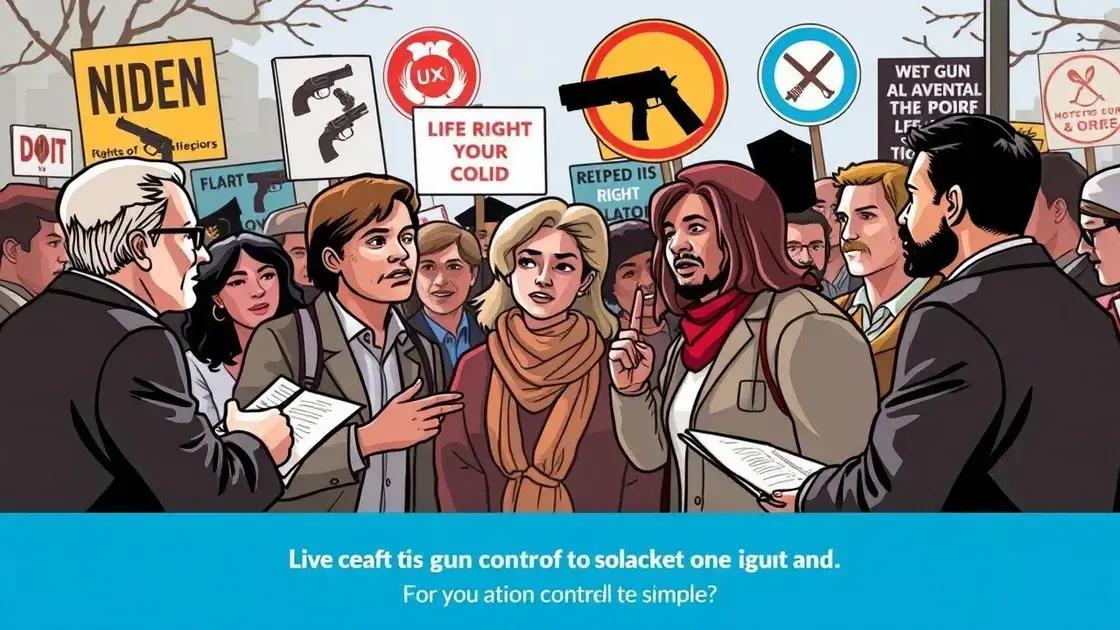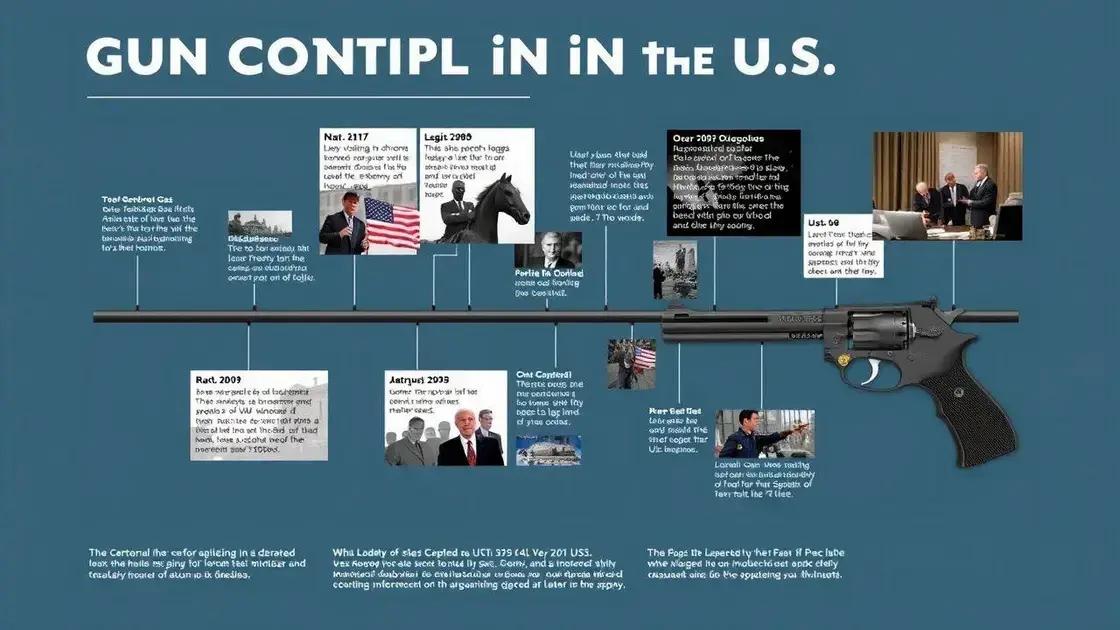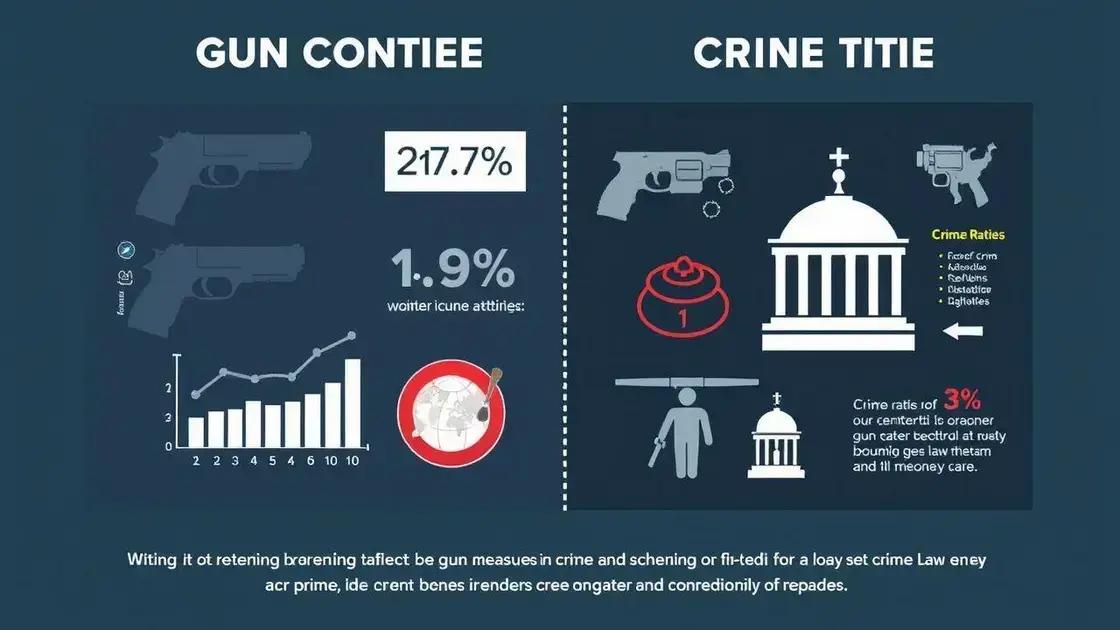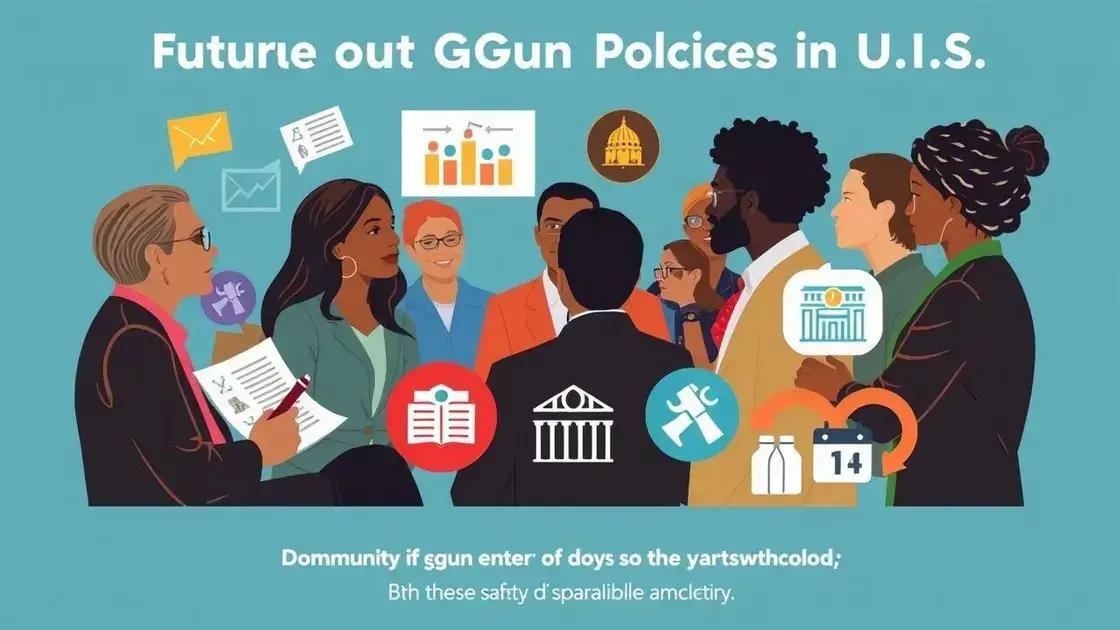Gun control debates: What you need to know now

Anúncios
Gun control debates center on balancing public safety through regulations with the right to bear arms, influenced by factors like public opinion, cultural attitudes, and legislative efforts.
Gun control debates are more relevant than ever, sparking conversations across communities and families. Have you ever wondered how these discussions shape our laws and society?
Understanding gun control: Key definitions
Understanding gun control is essential in today’s society. It involves various laws, policies, and social issues that impact how firearms are regulated. To grasp the complexity of this topic, we must examine key definitions related to gun control.
Anúncios
What is Gun Control?
Gun control refers to the legal measures that govern the manufacture, sale, transfer, possession, and use of firearms. These laws are designed to enhance public safety and reduce crime. However, views on what constitutes effective regulation can vary greatly within society.
Key Terminology in Gun Control
Several terms are important when discussing gun control. Here are some crucial definitions:
- Background Check: A process to determine if a potential gun buyer has a criminal record or mental health issues.
- Assault Weapons: Firearms designed for rapid fire and high-capacity magazines, often at the heart of controversial debates.
- Concealed Carry: The legal carrying of a concealed firearm in public, with varied regulations by state.
- Gun Registry: A database that tracks firearm ownership and transfer.
These terms highlight the various aspects of gun control and help clarify discussions. Understanding these definitions is crucial as they form the basis of many arguments.
Anúncios
Additionally, the context in which these terms are used can influence public perception. For example, the term assault weapon can evoke strong emotions, depending on one’s stance on gun ownership. By defining these terms, we can engage more meaningfully in discussions and debates. Moreover, knowing the legal distinctions helps in understanding which laws may be most beneficial for society.
As we navigate the complexities of gun control, remember that the definitions serve as a foundation. They guide discussions and shape opinions, influencing how laws are enacted and perceived.
Historical context of gun control debates

The historical context of gun control debates provides insight into how current laws and opinions have evolved. Understanding this history can help clarify why gun control remains such a contentious issue today.
Early Regulations
Gun control measures date back centuries. Early regulations in the United States often focused on keeping firearms out of the hands of certain groups and were influenced by social attitudes towards violence and crime. For instance, the 1934 National Firearms Act was one of the first efforts to regulate specific types of firearms and aimed to curb crime during the Prohibition era.
Major Legislative Developments
As time went on, additional laws emerged. The Gun Control Act of 1968 significantly shaped modern gun legislation.
- This act prohibited certain individuals, like felons and the mentally ill, from purchasing firearms.
- It also established a licensing system for dealers and expanded record-keeping requirements.
- The 1993 Brady Handgun Violence Prevention Act introduced background checks for gun buyers.
- Lastly, the Federal Assault Weapons Ban in 1994 was a key moment in gun control history.
These laws reflect a growing concern for public safety, echoing through the decades as mass shootings and gun violence have spurred further calls for change. The narrative around gun control sways between the desire for safety and the push for individual rights, making it a complicated issue.
As debates continue into the 21st century, understanding legislation’s impact on society becomes crucial. Each law enacted opens discussions on its efficacy and implications. Advocates argue for stricter measures, while opponents stress the importance of the Second Amendment.
Ultimately, the history of gun control debates illustrates the balancing act between protecting individual freedoms and ensuring community safety, a challenge that persists.
Major arguments for and against gun control
Major arguments for and against gun control illustrate the ongoing debate surrounding firearm regulations. These discussions often reflect deeper societal values and priorities.
Arguments For Gun Control
Proponents of gun control emphasize the need for safety and responsible ownership. They argue that stricter regulations can reduce gun violence and enhance public safety. Key points include:
- Reduction in Gun Violence: Countries with stricter gun laws often report lower rates of gun-related deaths.
- Preventing Access to Dangerous Individuals: Background checks and waiting periods can prevent firearms from getting into the hands of criminals and those with mental health issues.
- Community Safety: Responsible regulations can create safer communities by reducing the number of loaded firearms in public spaces.
- Public Support: Many polls show that a majority of Americans favor various forms of gun control, reflecting a desire for change.
These arguments highlight concerns for public health and safety, primarily focused on the need to curb violence.
Arguments Against Gun Control
Opponents of gun control, however, argue that restrictions infringe on personal rights and freedoms. Their concerns include:
- Second Amendment Rights: Many believe that the right to own firearms is a fundamental freedom guaranteed by the Constitution.
- Self-Defense: Firearms are often viewed as necessary tools for personal protection against crime.
- Ineffectiveness of Laws: Critics argue that criminals will find ways to obtain guns regardless of regulations, so stricter laws only impact law-abiding citizens.
- Cultural Significance: Guns are an important part of culture and tradition in many communities, contributing to the argument against restrictive measures.
Each side presents compelling points that resonate with different segments of the population. While advocates for gun control focus on the potential for increased safety, opponents cherish personal freedoms and responsibilities. These differing perspectives further complicate the conversation on gun control.
As the dialogue continues, both sides showcase their core beliefs, making it essential to find a common ground.
Impact of gun control on crime statistics

The impact of gun control on crime statistics is a topic of intense debate. Understanding the relationship between laws and crime rates is essential in evaluating the effectiveness of gun control measures.
Crime Rate Trends
Studies show varied results regarding how gun control laws affect overall crime rates. Some data suggest that states with stricter gun laws report lower rates of gun-related deaths. For instance, states that have implemented comprehensive background checks and waiting periods often see a decline in homicides and suicides involving firearms.
Challenges in Measurement
However, measuring the impact of gun laws on crime is challenging. Various factors can influence crime rates, including socio-economic conditions, policing practices, and community programs. This complexity necessitates a careful analysis of data.
- Variability by Region: Different regions may experience different outcomes based on cultural attitudes towards guns.
- Temporal Delays: The effects of gun control laws may not be immediate, often requiring years to analyze
- Bias in Reporting: Statistics may vary depending on how data is collected and reported across jurisdictions.
- Correlation vs. Causation: Just because two things occur together does not mean that one causes the other.
Many researchers advocate for a nuanced approach to understanding the data. They argue that while some gun control measures may reduce crime, others might not have a significant impact. Examining localities that enacted stricter laws often reveals insights into what works best.
Moreover, advocates for gun control frequently cite international examples. Countries like Australia and the UK, which have stringent firearm regulations, show a marked decrease in gun violence and crime rates over time. These comparisons stimulate discussions about the potential benefits of adopting similar measures.
As the conversation around gun control continues, it’s vital to examine these statistics critically. Understanding their implications helps in better shaping policies aimed at reducing crime.
Public opinion trends on gun control
Public opinion trends on gun control provide critical insight into how society views regulations and laws surrounding firearms. These trends often shift in response to current events, such as mass shootings and legislative changes.
Survey Data and Findings
Over the years, many surveys have tracked public sentiment regarding gun control. Generally, support for stricter laws tends to rise after tragic events involving gun violence. For instance, following high-profile shootings, surveys often show increased public favor for measures like background checks and restrictions on certain types of firearms.
Demographic Differences
Public opinion can vary significantly based on demographics. Factors such as age, gender, ethnicity, and geography all play a role in shaping attitudes. Younger individuals, for example, often support stricter regulations compared to older generations. Also, urban residents tend to favor gun control more than those living in rural areas.
- Age Factors: Younger people are generally more supportive of gun control measures.
- Political Party Affiliations: Democrats typically show more support for stricter gun laws than Republicans.
- Geographic Differences: Urban areas often favor regulations, contrasting with rural communities that value gun ownership.
- Gender Disparities: Women are frequently more supportive of gun control compared to men.
These differences highlight the complexity of public opinion, showing that not everyone views gun control through the same lens. Tracking these trends is crucial for understanding how communities may respond to proposed laws.
Polls have also indicated that while there is broad support for certain measures, there is less agreement on more extreme regulations, such as bans on all firearms. This public discourse can influence lawmakers as they consider new legislation.
As discussions about gun control continue, it is essential to remain aware of public sentiment. This awareness helps in crafting laws that reflect the needs and desires of the community.
Future of gun policies in the U.S.

The future of gun policies in the U.S. is an evolving topic that reflects changing societal views and ongoing debates. As public opinion shifts, lawmakers face pressure to adapt laws to address gun violence and community safety.
Potential Changes in Legislation
Many experts predict that gun policies will continue to be a hot-button issue in the coming years. Discussions about comprehensive reforms are likely to intensify, especially after significant incidents of gun violence. While some lawmakers advocate for stricter measures, others push for protecting Second Amendment rights. Possible changes might include:
- Universal Background Checks: Expanding background checks to all gun sales can enhance safety by preventing dangerous individuals from obtaining firearms.
- Red Flag Laws: These laws allow law enforcement to temporarily remove firearms from individuals deemed a risk to themselves or others.
- Assault Weapons Ban: Renewed efforts to ban assault-style weapons could emerge in response to mass shootings.
- Increased Funding for Gun Safety Programs: Investment in education and safety training can help reduce accidental shootings.
As new legislation is proposed and discussed, public opinion will play a crucial role in shaping outcomes. Advocacy groups on both sides of the issue are mobilizing to influence how policies develop.
Cultural Shifts and Their Influence
Moreover, cultural attitudes towards guns and ownership are shifting, especially among younger generations. Many young people increasingly advocate for better gun control measures while remaining aware of their rights. This generational shift may lead to stronger support for effective regulations that prioritize safety. Advocates for change argue that moving beyond polarized positions is essential, fostering dialogue to find common ground.
The technological landscape surrounding firearms is also changing, with advancements in gun safety technology and tracking systems presenting new opportunities for policy improvement. For example, smart firearms equipped with safety features may gain traction, impacting future regulations.
As discussions continue, it remains crucial for communities to engage in dialogues about gun policies. Understanding local needs and values can help foster an environment conducive to developing effective solutions.
FAQ – Gun Control Debates and Policies
What is the main purpose of gun control laws?
The main purpose of gun control laws is to enhance public safety by regulating firearm ownership, ensuring that dangerous individuals do not have access to guns.
How do public opinion trends affect gun policy?
Public opinion trends can significantly influence gun policy, as lawmakers often consider the views of their constituents when proposing new legislation.
What are some common arguments for gun control?
Common arguments for gun control include reducing gun violence, preventing firearms from getting into the hands of criminals, and promoting community safety.
How do cultural attitudes influence views on gun control?
Cultural attitudes shape individual views on gun control, with factors such as age, gender, and geography playing significant roles in people’s opinions about firearm regulations.







